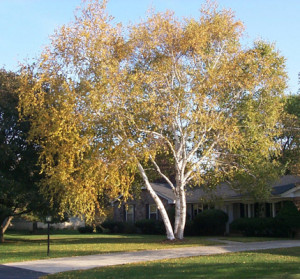Best Fertilizer for River Birch Trees
If you have a river birch tree, or are thinking about planting one, you might be wondering what the best fertilizer is. Here is some information that can help you make a decision.
River birch trees are native to North America and are tolerant of a wide range of soil conditions.
They prefer moist, well-drained soil but will also do well in dry soils. River birches are not particularly picky when it comes to fertilizer, but they do need it. The best time to fertilize your river birch is in early spring before new growth begins.
When it comes to finding the best fertilizer for your river birch trees, there are a few things you need to take into consideration. The first is the age of your tree – young trees will need a different type of fertilizer than older ones. Secondly, you need to think about the time of year – different fertilizers work better at different times of the year.
And finally, you need to consider what type of soil you have and how much sun and water your tree gets. With all that in mind, here are our top three picks for the best fertilizer for river birch trees…
1. For young trees: Miracle-Gro Water Soluble Tree & Shrub Food
This fertilizer is perfect for young river birch trees as it provides them with essential nutrients they need to grow strong and healthy. It also contains micronutrients which help promote root growth. Plus, it’s easy to use – simply mix it with water and apply it around the base of your tree.
2. For established trees: Espoma Tree-Tone Organic Fertilizer
If you have an established river birch tree, this organic fertilizer from Espoma is a great option. It’s made from natural ingredients like composted manure and bone meal, so it’s gentle on your tree yet still packs a punch when it comes to nutrition.
It also helps improve drainage and aeration in heavy soils, which is ideal if you live in an area with clay soil like we do here in Virginia. Simply apply it around the base of your tree once per season (in spring or fall) and water it in well after application . 3 .
For all stages : Jobe’s Organics All Purpose Fertilizer Spikes This product is great because it can be used on both young and established river birches alike . The spikes make application quick and easy , plus they last up to 8 weeks so you don’t have to worry about re-applying as often . Just insert them around the drip line of your tree (the outermost edge of its canopy) at a rate of 1 spike per square foot , being sure not to touch the trunk itself , and water thoroughly after application .

Credit: hawkslandscape.com
Should You Fertilize River Birch Trees?
Yes, river birch trees should be fertilized. They are fast-growing trees that are often used for landscaping purposes. They are relatively easy to care for, but like all trees, they need to be fertilized in order to stay healthy and continue growing.
The best time to fertilize a river birch tree is in the spring, before new growth begins. This will give the tree the nutrients it needs to produce healthy leaves and branches. It’s important to use a fertilizer that is specifically designed for trees; don’t use a lawn fertilizer, as this can actually harm the tree.
Apply the fertilizer according to the manufacturer’s instructions; too much fertilizer can burn the roots of the tree and damage it.
When Should I Fertilize My Birch Tree?
Your birch tree will need to be fertilized in the early spring, before new growth begins. You can use a general-purpose fertilizer that is labeled for trees and shrubs. Apply the fertilizer according to the package directions.
How Do I Keep My River Birch Healthy?
As with any plant, there are a few basic things you can do to keep your river birch healthy. First, make sure it is getting enough sunlight. River birches prefer full sun, but will tolerate partial shade.
Second, water your river birch regularly. Birches are relatively drought-tolerant once they are established, but during hot weather or extended periods of drought, they will need to be watered more frequently. Be sure to check the soil before watering; if it is already moist, then you don’t need to water.
Third, fertilize your river birch annually in early spring using a balanced fertilizer such as 10-10-10. Fourth, prune away any dead or diseased branches as needed. Finally, watch for pests and diseases and take action if you see any problems developing.
If you follow these basic guidelines, your river birch should stay healthy for many years to come!
How Do You Feed a River Birch?
When it comes to feeding a river birch, you want to make sure that you are using a fertilizer that is high in nitrogen. This will help to promote new growth and keep the leaves looking green and healthy. You should apply the fertilizer in early spring and then again in mid-summer.
Be sure to water the tree well after each application of fertilizer.
Best Fertilizer For River Birch Trees | Fertilize Them The Right Way
Best Fertilizer for Birch Trees
Birch trees are a beautiful addition to any landscape. But like all trees, they need the right care to thrive. That includes using the best fertilizer for birch trees.
What makes a fertilizer the best for birch trees? It depends on the tree’s needs. All fertilizers contain nutrients that trees need for growth, but different types of fertilizers have different ratios of these nutrients.
The best fertilizer for your birch tree will depend on its stage of life and what it needs most at that time.
For example, young trees need more nitrogen than mature trees because they’re growing more leaves and stems. So if you have a young birch tree, look for a fertilizer with a higher ratio of nitrogen.
Mature trees, on the other hand, need more phosphorus to encourage root growth. So if you have an older birch tree, choose a fertilizer with a higher ratio of phosphorus.
You should also consider the time of year when choosing a fertilizer for your birch tree.
In general, spring is the best time to fertilize because that’s when new growth begins. But you can also fertilize in early fall to give your tree one last boost before winter dormancy sets in.
When applying fertilizer to your birch tree, always follow the manufacturer’s instructions carefully.
Over-fertilizing can damage roots and lead to unhealthy growth patterns. And be sure to water deeply after applying fertilizer so it can reach the roots where it’s needed most!
Miracle-Gro for Birch Trees
If you’re looking for a way to give your birch trees a little extra boost, consider using Miracle-Gro. This product can help your trees grow faster and produce more leaves, making them healthier and more beautiful. Here’s what you need to know about using Miracle-Gro on birch trees.
When to Use It
Miracle-Gro should be applied early in the growing season, before the leaves start to open. This will give the roots time to absorb the nutrients from the fertilizer and get a head start on growth.
You can apply it again in mid-summer if you want, but be sure not to use it too late in the season or you may end up encouraging new growth that won’t have time to harden off before winter comes.
How Much to Use
The amount of Miracle-Gro you’ll need will depend on the size of your tree.
For a small tree, mix 1 tablespoon of fertilizer with 1 gallon of water. For a medium tree, use 2 tablespoons per gallon, and for a large tree, use 3 tablespoons per gallon. Apply the mixture evenly around the base of the tree, taking care not to get any on the trunk or leaves.
Water deeply afterwards so that the roots can absorb all of the nutrients they need.
Best Mulch for Birch Trees
When it comes to mulch, there are a lot of options out there. But what is the best mulch for birch trees?
Well, one option is pine straw.
Pine straw is an excellent choice for mulching because it has a high acidity level. This acidity will help to keep your birch trees healthy and free from disease. Pine straw also breaks down slowly, so you won’t have to replace it as often as other types of mulch.
Another good option for birch trees is cedar chips. Cedar chips are also high in acidity and they break down slowly. They also have a nice aroma that can help to keep your yard smelling fresh.
No matter which type of mulch you choose, make sure that you apply it around the base of the tree in a thick layer. This will help to protect the roots and prevent weeds from growing up around the tree. Mulching is an important part of tree care, so take some time to find the best mulch for your birch trees!
White Birch Tree Fertilizer
If you have a white birch tree on your property, you may be wondering what kind of fertilizer to use. Here is some information to help you make the best decision for your tree.
White birch trees are native to North America and prefer acidic soils.
They are a popular choice for landscaping because they are relatively low maintenance. However, like all trees, they do need some care and attention.
Fertilizing your white birch tree is important to maintain its health and vigor.
The best time to fertilize is in early spring, before new growth begins. You can also fertilize in late fall, after the leaves have dropped.
There are many different types of fertilizer available on the market today.
It’s important to choose one that is specifically formulated for acid-loving plants like white birches. Look for a fertilizer with a high percentage of nitrogen, phosphorus, and potassium (NPK). A good ratio to look for is 10-10-10 or 20-20-20.
Applying fertilizer correctly is also important. Be sure to follow the directions on the package carefully. Overfertilizing can damage your tree, so it’s better to err on the side of caution.
Best Fertilizer for Mimosa Tree
Mimosa trees are native to tropical and subtropical regions of the world, so they need a fertilizer that can provide them with the nutrients they need to thrive. A good fertilizer for a mimosa tree should be high in nitrogen and phosphorus, which will help promote growth. It should also contain trace elements like magnesium, iron, and zinc, which are essential for the health of the tree.
How to Water a River Birch Tree
If you’re lucky enough to have a river birch tree (Betula nigra) in your yard, you know that these beautiful trees are well worth the extra care they need to stay healthy and thrive. River birches are native to the southeastern United States and are often found near streams or rivers, hence their name. These majestic trees can grow up to 70 feet tall and live for 100 years or more, making them a wonderful addition to any landscape.
While river birches are relatively tolerant of different soil types, they do prefer moist, well-drained soils. This is especially important when watering your river birch tree. Over-watering can lead to root rot, so it’s important to make sure the soil around your tree is not waterlogged.
The best way to water a river birch tree is with a soaker hose or drip irrigation system that slowly applies water directly to the roots of the tree.
When first planting a river birch tree, water it deeply once a week for the first few months. Once established, water your river birchtree every 7-10 days during periods of drought or heat wave.
Make sure to keep an eye on the leaves of your tree as well – if they start to droop or turn brown, that’s an indication that the tree needs more water.
With just a little bit of extra care, you can enjoy your river birch tree for many years to come!
Slow Release Tree Fertilizer
Slow release tree fertilizer is a great way to provide your trees with the nutrients they need in a slow and steady manner. This type of fertilizer is usually applied in granular form and slowly breaks down over time, releasing nutrients into the soil as it does. This provides a consistent supply of nutrition for your trees, which can help them stay healthy and strong.
Tree Help Fertilizer
When it comes to trees, fertilizer is key to keeping them healthy and strong. But with so many different types and brands of fertilizer on the market, it can be tough to know which one is right for your tree. Here’s a quick guide to help you choose the best fertilizer for your tree:
In general, trees need three main things from fertilizer: nitrogen, phosphorus, and potassium. These are typically referred to as NPK values. Nitrogen helps leaves grow large and green, phosphorus encourages root growth, and potassium helps overall plant health.
When choosing a fertilizer for your tree, look for one with an NPK value that matches the needs of your particular tree species. For example, evergreens like pines and spruces need more nitrogen than deciduous trees like oaks and maples. Also pay attention to the form of the fertilizer (liquid, granular, etc.) as well as how often it needs to be applied – both of these will vary depending on the type of fertilizer you choose.
Finally, don’t forget that trees also need other nutrients like magnesium, sulfur, calcium, and iron. While these aren’t typically found in fertilizers designed specifically for trees, they can be added through soil amendments or composting. By giving your tree all the nutrients it needs – not just NPK – you’ll help ensure its long-term health!
Conclusion
When it comes to river birch trees, the best fertilizer is one that is high in phosphorus. This will help promote root growth, which is essential for these trees. In terms of timing, it is best to fertilize river birch trees in late winter or early spring.
This will give them a boost before they start growing for the season.

